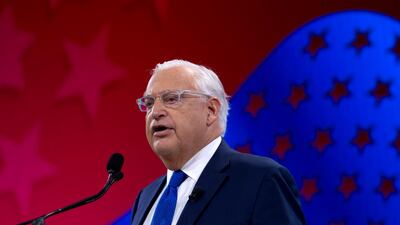In a recent interview with the New York Times, US ambassador to Israel David Friedman opened the door to Israeli annexation of Palestinian territory. "Under certain circumstances," Mr Friedman said, "I think Israel has the right to retain some, but unlikely all, of the West Bank." Senior Palestinian diplomat Saeb Erekat has responded in a tweet describing Mr Friedman as an "Extreme Ambassador of the Settlers", and stated that annexation can only lead to "endless conflict". Mr Friedman's words are, indeed, deeply troubling. Annexation goes against international law, and would trample claims to Palestinian statehood. Mr Friedman's statement follows Prime Minister Benjamin Netanyahu's pledge to annex large parts of the West Bank in April, during the last days of his campaign for re-election.
Such a development would effectively bury any chance of a two-state solution, which the US has previously always claimed to support. Mr Friedman has made it clear to the world that, in addition to largely overlooking the mushrooming of illegal settlements in the West Bank for the past decade, the US is now willing to consider the idea of annexation. Thanks to Mr Netanyahu’s encouragement and the inaction of the international community, the number of illegal settlements has increased drastically. In 10 years, the total settler population has almost doubled, from 440,000 individuals in 2004 to more than 800,000 in 2014. This, in turn, has allowed Israeli forces to increase their presence in these areas, on the pretext of protecting Israeli citizens. This programme of expansion has given Israeli hardliners a perfect excuse to demand the wholesale annexation of these territories.
Now, with powerful US officials having longstanding interests in the growth of illegal settlements, the outlook is bleak for Palestinians. Take Mr Friedman for example. He has long enjoyed close ties to Israel, owns a penthouse in Jerusalem and has helped to raise funds for projects in the illegal settlement of Beit El, in the occupied West Bank. As for Mr Trump’s son-in-law and senior White House adviser Jared Kushner, he has been made responsible for devising and delivering the US administration's Middle East peace plan, despite having previously worked for a family company that funded illegal settlements. Surely such conflicts of interest make it clear that such men are incapable of facilitating an equitable peace that recognises the rights of the Palestinian people.
With Israel heading towards another round of elections after Mr Netanyahu's failure to form a government and Mr Kushner still to unveil his long-awaited plan, it is far from guaranteed that annexation will take place. However, the open discussion of the possibility by Israel and the qualified support of high-ranking US officials, creates an environment in which the prospect of Palestinian statehood dwindles by the day.

